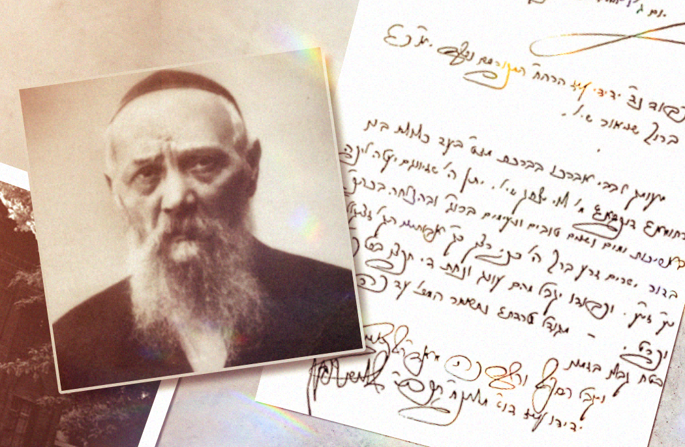
Rabbi Levi Yitzchak Schneerson, father of the Seventh Lubavitcher Rebbe, was a master Halachist (an expert in Jewish law), a beloved communal leader and a world-famous Kabbalist. Serving as Rabbi in Yekaterinoslav (Dnipro), Ukraine, for over three decades, he was instrumental in keeping Yiddishkeit alive in the early, dark days of the Soviet Union.
1. Rabbi Levi Yitzchak Was Born in Dobryanka, Ukraine
Rabbi Levi Yitzchak Schneerson was born on the 18th of Nissan, 1878 (5638), in the town of Dobryanka (also called Padobryanka), which is situated midway between the cities of Gomel (Belarus) and Chernigov (Ukraine). His father was Rabbi Baruch Schneur Zalman Schneerson, a great-grandson of Rabbi Menachem Mendel, the third Chabad Rebbe known as the, Tzemach Tzedek of Lubavitch. His mother, Zelda Rachel Chaikin, stemmed from an illustrious family of Chabad chassidim. Her uncle, Rabbi Yoel Chaikin, was the Chabad Rabbi of Dobryanka and the primary teacher of Rabbi Levi Yitzchak in his youth.
Learn More About the Tzemach Tzedek
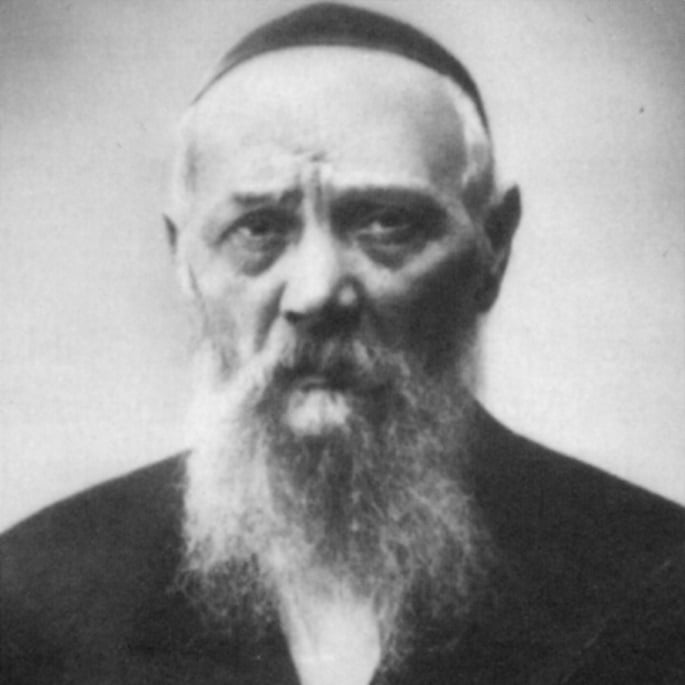
2) The Fifth Chabad Rebbe Suggested His Match
Recognizing Rabbi Levi Yitzchak’s genius and promise, the fifth Rebbe of Chabad-Lubavitch, Rabbi Shalom DovBer Schneersohn (pictured left) took a particular interest in the young scholar. He even suggested a marriage proposal to Chana, the daughter of Rabbi Meir Shlomo Yanovsky of Nikolayev (in Ukraine). The couple married on June 10, 1900 (5660), in Nikolayev. Starting from 1902 (5662), Rabbi Levi Yitzchak became deeply involved in communal initiatives, taking part in important meetings convened by Rabbi Shalom DovBer.
Read the Memoirs of Rebbetzin Chana Schneerson

3) His Firstborn Son, the Rebbe, Was Born in Nikolayev
In the spring of 1902 (5662), Rabbi Levi Yitzchak and Rebbetzin Chana welcomed their firstborn son into the world. His brit (circumcision ceremony) coincided with Rabbi Levi Yitzchak’s 24th birthday. The baby was named Menachem Mendel, after his ancestor the Tzemach Tzedek. With time he would follow in the footsteps of his namesake, becoming the seventh Rebbe of Chabad-Lubavitch. A second son was born in 1904, and a third in 1909. They were named DovBer (Berel) and Yisrael Aryeh Leib (Leibel), respectively. During this time, the young family lived in Nikolayev, where Rabbi Levi Yitzchak furthered his studies.
Read More About the Schneersohn Home

4) He Received Rabbinic Ordination From the Famed Rabbi Chaim Soloveitchik of Brisk
From 1905 (5665) and on, Rabbi Shalom DovBer actively sought a suitable rabbinic position for Rabbi Levi Yitzchak. One particular community that had considered his appointment demanded that he receive a certificate of ordination from Rabbi Chaim Soloveitchik of Brisk, a famous Talmudic scholar and communal leader. When Rabbi Levi Yitzchak asked Rabbi Shalom DovBer for a letter of introduction, the latter assured him that no such letter would be necessary, encouraging him to travel to Brisk in person, and expressed confidence that Rabbi Chaim would independently approve of him. The Rebbe related that Rabbi Chaim presented his father with a practical and complex legal question that had come to his attention, involving the laws of Shabbat and Sukkot. Rabbi Levi Yitzchak’s answer, which was both simple and innovative, greatly impressed Rabbi Chaim.
Learn More: My Sukkah Is Your Sukkah

5) In 1909 He Became Rabbi in Yekaterinoslav (Dnipro)
In 1909 (5669), the family moved to Yekaterinoslav (later renamed Dnipropetrovsk and then Dnipro), where Rabbi Levi Yitzchak would serve in the rabbinate for 30 years, eventually becoming chief rabbi of the city. Over the course of this time, Rabbi Levi Yitzchak fought tirelessly on behalf of his community, struggling for their religious rights and providing for their physical and spiritual needs. At a time when many rabbis tried to leave the Soviet Union rather than risk arrest, exile, or worse, Rabbi Levi Yitzchak declined several offers for prestigious rabbinic positions in the Holy Land.

6) He Worked Tirelessly for Humanitarian Causes
In 1914-15, (5674-75), during the early years of World War I, Russian military commanders expelled Jews who were close to the front and forced them eastward. Yekaterinoslav absorbed a large influx of refugees, and both Rabbi Levi Yitzchak and Rebbetzin Chana did their utmost to provide for them. Unfortunately, this was only the beginning of the troubles that plagued the region. The Russian Revolution of 1917 cast all of Russia into civil war, but the fighting was particularly intense and prolonged in the Ukraine, with Yekaterinoslav changing hands a number of times. The Jews were singled-out for particularly harsh treatment by whomever happened to be in control.
Watch The Rebbe Share Memories of His Parents’ Humanitarian Efforts

7) He Helped Fill the Void Left by the Passing of the Fifth Rebbe, Rabbi Shalom DovBer
During the dark days of Soviet oppression, on March 21, 1920 (2nd of Nissan, 5680), the fifth Lubavitcher Rebbe, Rabbi Shalom Dovber, passed away. This was a tremendous blow for Russian Jewry. Rabbi Yosef Yitzchak, the only son of Rabbi Shalom DovBer, turned to Rabbi Levi Yitzchak and other regional leaders to rally Jewish activists and to rebuild the Chabad network. The ongoing battles had devastated large parts of Russia and Ukraine, leaving Jewish communal infrastructures in ruins. The situation was desperate. Rabbi Levi Yitzchak was instrumental to these rebuilding efforts, supporting Rabbi Yosef Yitzchak every step of the way. Eventually both he and Rabbi Yosef Yitzchak would be arrested by the communists as a result of these activities.

8) 300 Guests Joined Him at the Wedding That He Did Not Attend
In 1927 (5687), as the grip of communism grew ever tighter, Rabbi Yosef Yitzchak was arrested and eventually exiled to Riga, Latvia. By this time Rabbi Levi Yitzchak’s firstborn, Rabbi Menachem Mendel, was the suitor for the Rebbe’s daughter, Chaya Mushka. Due to various delays however, their wedding did not take place until November, 1928. It was hoped that the communist authorities would provide permits for Rabbi Levi Yitzchak and his wife to attend their son's wedding; this did not materialize. Rebbetzin Chana was determined to arrange a celebration of their own, although physically distanced from the wedding event. She writes in her memoirs, “Owing to the threatening nature of the situation that prevailed then, we expected less than thirty guests. Instead about three hundred people came.” The celebration lasted until dawn, juxtaposed feelings of intense joy and intense anguish were felt by all those in attendance.
Read the Rebbe’s Mother’s First Hand Account of the Shadow Wedding
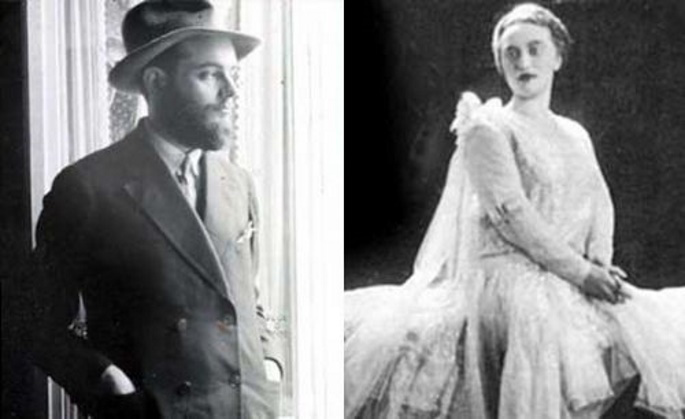
9) He Was Arrested by the Secret Police at 3 A.M.
On March 28, 1939 (5699), at 3:00 a.m., four agents of the NKVD (the communist secret police) arrived at the Schneerson home. After searching the house and confiscating many of his manuscripts, Rabbi Levi Yitzchak was arrested and incarcerated for the “crime” of spreading Judaism. After more than a year of interrogations, he was taken to Moscow for “trial,” and was sentenced to five years of exile in the remote village, Chiali, Kazakhstan. The conditions in Chiali were very difficult for Rabbi Levi Yitzchak and his wife, lacking even the most basic supplies. Even so, Rebbetzin Chana made great efforts to enable him to continue to transcribe his Torah insights. She was able to create a crude ink from plants, enabling him to continue to write.
Read the Rebbe’s Mother’s First Hand Account Here
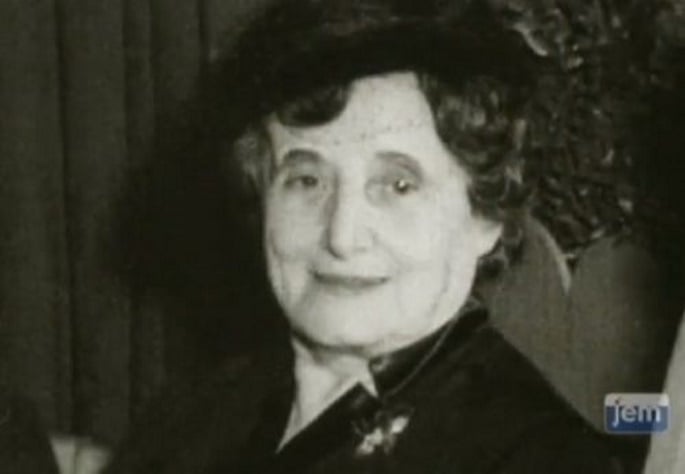
10) Rabbi Levi Yitzchak Was an Expert Kabbalist
Throughout his life, Rabbi Levi Yitzchak wrote copiously. Apart from Halachic responsa (answers to questions of Jewish law), he wrote extensively on Kabbalah, intertwining the revealed and hidden aspects of Torah. During his arrest and interrogation, the NKVD attempted to confiscate these precious manuscripts and even placed them in their vehicle to be taken away. However, Rebbetzin Chana entreated that they leave them . After consulting their superiors via telephone, the guards relented. Unfortunately, when Rebbetzin Chana joined her husband in exile, which she did voluntarily, she was forced to leave this collection behind. Apparently, it was confiscated by the Nazis, never to be seen again. The only writings to survive were those written in exile in Kazakhstan and smuggled out by Rebbetzin Chana to New York. Decades later, the Rebbe commissioned these manuscripts for printing, resulting in a five-volume set, titled, Likutei Levi Yitzchak.

11) Rabbi Levi Yitzchak Passed Away in Soviet Exile
As his five-year sentence was drawing to a close, Rabbi Levi Yitzchak increasingly weakened. After much difficulty, the Jewish community of Almaty, Kazakhstan, was able to secure permission so that the Schneersons could relocate there. The couple finally arrived in the spring of 1944, but Rabbi Levi Yitzchak grew ever weaker. He passed away not long afterwards on the 20th of Av and is buried in Almaty. Eventually his wife Rebbetzin Chana was able to make it to New York to reunite with her son, Rabbi Menachem Mendel, the Rebbe.
Watch The Rebbe Talk About His Father’s Legacy

Read more about the life and times of Rabbi Levi Yitzchak Schneerson in this two-part series:




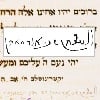


Join the Discussion